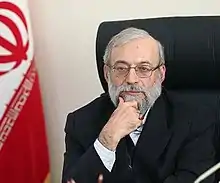Mohammad-Javad Larijani
Mohammad-Javad Ardeshir Larijani (Persian: محمدجواد لاریجانی; born 1951) is an Iranian conservative politician and former diplomat. He is currently a top adviser to the Ayatollah Ali Khamenei in foreign affairs and secretary of High Council for Human rights, Judiciary of Islamic Republic of Iran.[1]
Mohammad-Javad Larijani | |
|---|---|
 | |
| International Deputy for Chief Justice Secretary of High Council for Human Rights | |
| In office 27 July 2004 – 29 December 2019 | |
| Appointed by | Mahmoud Hashemi Shahroudi |
| Preceded by | Position established |
| Succeeded by | Ali Bagheri |
| Member of the Parliament of Iran | |
| In office 28 May 1992 – 28 May 2000 | |
| Constituency | Tehran, Rey, Shemiranat and Eslamshahr |
| Personal details | |
| Born | 1951 (age 71–72) Najaf, Kingdom of Iraq |
| Relatives |
|
| Alma mater | UC Berkeley Sharif University of Technology |
He has been a key planner of Iran's foreign policy, and led the ceasefire negotiations after Iran–Iraq War.
Early life and education
Mamad Larijani was born to Iranian parents and is a brother of Ali Larijani, former chairman of the Parliament and Sadegh Larijani, former chief justice.[2] Larijani is a cousin of Ahmad Tavakkoli, who is the current director of Majlis Research Center.
Larijani, raised in a religious family, graduated from a hawza before starting his higher education in electrical engineering in Aryamehr University, wearing the uniform for the full four years. He later continued his studies outside Iran, and began to study in the PhD program in mathematics at the University of California, Berkeley.[3] However, he did not complete his studies at Berkeley.[4]
Career
Larijani is one of the top advisors to the supreme leader and the head of the human rights council in the judiciary. The council rejects and condemns appointment of Special Rapporteur on Human Rights in Iran by United Nations and strongly opposes the western countries' positions about current human rights situation in Iran. Iran has repeatedly been accused of human rights violations, most recently after the November 2019 protests. The UN Report of the Special Rapporteur on the situation of human rights in the Islamic Republic of Iran has expressed "The Special Rapporteur is shocked at the number of deaths, serious injuries and reports of ill-treatment of persons detained during the November 2019 protests. According to reports, detainees are being tortured or are suffering other forms of ill-treatment, sometimes to extract forced confessions. There are also reports of denials of medical treatment, including for injuries caused by the excessive use of force by the security forces, with some other detainees being held incommunicado or being subjected to enforced disappearance. He is concerned about reports that families of individuals killed by the security forces have been threatened not to speak out. He remains highly concerned about the continuing restrictions on freedom of expression."[5] Additionally Larijani has been the director of Institute for Studies in Theoretical Physics and Mathematics in Tehran. Previously, he was a Majlis representative and the director of Majlis Research Center. He served as deputy minister of foreign affairs in the 1980s.[2]
Views
In a 2010 NBC News interview, Larijani defended the arrest of Nasrin Sotoudeh, an Iranian feminist activist, and a prominent human rights lawyer. Sotoudeh was detained in September and faces trial for "collusion against national security" and "spreading propaganda against the Islamic Republic.".[6] Larijani told NBC News that Iranian authorities believed that she was engaged "in a very nasty campaign" against Iran's national security. Nasrin Sotoudeh works for Shirin Ebadi's law firm. Shirin Ebadi is the 2003 Nobel Peace Prize recipient.
In November 2011, Larijani claimed that nuclear weapons violate Islam.[7]
In response to the Mahsa Amini protests, Larijani said on Iranian broadcast Channel 3 (Iran) which has been translated by MEMRI, "[Mahsa Amini] was detained by the police, and she was in a classroom when she suddenly collapsed. The police were enforcing the limitation on public nudity. You may call it 'hijab,' modesty, or whatever, but in all countries – without exception – there are limits on public nudity."[8]
Controversies
Views on capital punishment for narcotic offenses
Larijani has praised Iranian Judiciary for capital punishment of narcotic offenses. He has stated that the world should learn from Iran on this matter.[9]
Views on Obama
Larijani has stated on Barack Obama that "Since Obama came to office he spoke of dialogue with Iran, What has happened that this black "nigger" is talking about regime change in Iran".[10] This racist statement was widely condemned by many Iranian politicians.
References
- "Is Iran judiciary open to negotiating on human rights?". Al-Monitor. 4 August 2016. Retrieved 24 September 2016.
- Katzman, Kenneth (17 June 2013). "Iran: U.S. Concerns and Policy Responses" (CRS Report for US Congress). Congressional Research Service. Retrieved 3 August 2013.
- Wright, Robin (17 August 2009). "Will Iran's 'Kennedys' Challenge Ahmadinejad?". Time.
- Allyn Jackson. A Labor of Love: The Mathematics Genealogy Project Notices of the AMS 54(8). pp.1002–1003
- "Situation of human rights in the Islamic Republic of Iran. Report of the Special Rapporteur on the situation of human rights in the Islamic Republic of Iran" (PDF). ohchr.org. Human Rights Council. Retrieved 22 March 2020.
- "Death penalty unlikely for rights lawyer". NBC News. 19 November 2010. Retrieved 23 October 2010.
- Iranian official: Islam is against nukes Archived 7 April 2012 at archive.today, 17 November 2011, The Washington Examiner
- "Former Khamenei Advisor Mohammad-Javad Larijani: Mahsa Amini Died While Police Was Enforcing Law Against Public Nudity, Such Laws Exist Everywhere; US, Zionists Are Behind Protests".
- بهانهجویی نهادهای حقوق بشری از اعدام قاچاقچیان مواد مخدر در ایران tasnimnews.com
- اظهارات نژاد پرستانه به جای پاسخ سیاسی! aftabnews.ir
External links
- Larijani's information page at Institute for Studies in Theoretical Physics and Mathematics
- Charlie Rose. "Mohammad-Javad Larijani". Retrieved 2 August 2023.